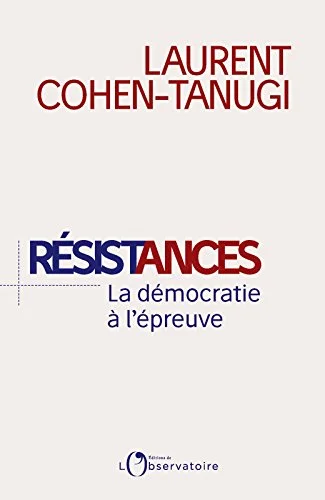RESISTANCES: DEMOCRACY IN THE BALANCE
Laurent Cohen-Tanugi
(Éditions de l’Observatoire, 117 pages, 2017)
In Resistances, Laurent Cohen-Tanugi takes up the reflection on democracy that he initiated in the mid-1980s with Law Without the State. This was overall a happier time for democracy as Southern Europe, and other regions of the world, celebrated the fall of dictatorships. More than thirty years later, the political landscape has dramatically changed. Since the turn of the millennium, the world has been witnessing the retreat of democracy and the rise of authoritarianism and intensified nationalism. Western democracies have been shaken to their core by a series of political earthquakes, from the Brexit vote in the United Kingdom to the stunning presidential victory of Donald Trump in the United States.
In May 2017, the election of the liberal and resolutely pro-European Emmanuel Macron as the new leader of the French Republic interrupted what seemed to be the unstoppable populist wave engulfing Europe and the United States. Macron’s victory may have allowed France to avoid the worst-case scenario, the election of the far-right candidate Marine Le Pen. But Cohen-Tanugi writes, “this fortunate outcome must not obscure the reality of a common diagnosis: a global crisis of liberal democracy, harboring a deliberate assault—political, ideological and geopolitical—on Western values and political systems.” Why, he asks, did three nations—France, the United Kingdom, and the United States—“each in its own way a symbol of the democratic ideal, take or, in the case of France, nearly take decisions that were detrimental to the national interest and often contrary to the values that they have always embodied [?] It is this momentous fact that we must investigate: how could this have happened, and above all how can it be resisted and remedied in the future?”
In this urgent book, Cohen-Tanugi takes stock of the gravity of these unprecedented historical events and asks whether they were merely an aberrant parenthesis or the presage of a new and foreboding world. For him, “the answers to these questions vastly transcend electoral analysis and the dominant theory that the populist wave represents the revenge of the ‘victims of globalization.’ The ills at the origin of the political shocks of 2016–17 and their aftermath call for a much more fundamental reflection on the prerequisites of liberal democracy, on the impact of technology and geopolitics on its functioning, and on the ways to counter the multiple threats it faces. Despite its misleading reference to the ‘people,’ populism is not an avatar of democracy, but rather its most resolute adversary. To reconcile popular sentiment and the democratic ideal: that is the imperious challenge facing all democracies today.”
Laurent Cohen-Tanugi is a Paris-based international lawyer and public intellectual, and a recognized expert on European affairs and international relations. He has published several influential books on democracy and the rule of law, European integration, transatlantic relations, and globalization, including The Shape of the World to Come: Charting the Geopolitics of a New Century (Columbia University Press, 2008) and An Alliance at Risk: The United and Europe Since September 11 (John Hopkins University Press, 2003).

